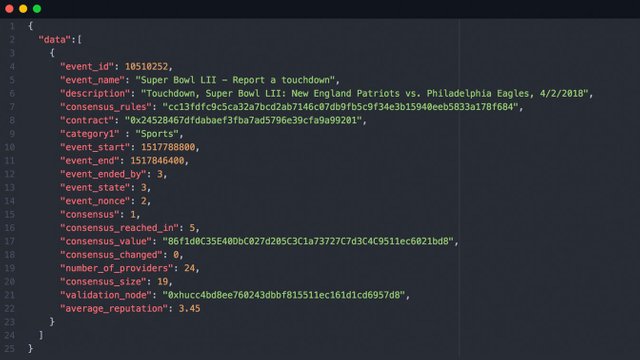Eventum - Understanding The Simple Terms
For those of you who did not read my last post, Eventum is a decentralised real world data feeds blockchain startup, using the blockchain as a court system to determine truths. An event is created by a developer and participants contribute data towards a specific consensus and are rewarded if they are part of the consensus.
This post outlines different aspects and breaks down what it is into an easier way of understand the project. At the end, these terms will be put together into a simple explanation with little technical chatter.
Event - An event is created with specified parameters in a smart contract. Since Eventum runs on the Ethereum platform, the smart contracts are written on the Ethereum platform. Parameters set in an event include but are not limited to:
- Event name
- Event start time
- Event end time
- Description of event
- Category
- Consensus rules
- Contract
- Category
- Reward
- Size of consensus
- Average reputation of data providers
- Minimum and maximum number of data providers required
Developer - A developer can be any individual or company that creates the event. Developers are required to provide the reward for participants in an event. The data that is sourced from Eventum is cheap and reliable and can include anything that the developer wants. He just has to specify it when creating the event.
Participants - Participants are users who use the platform and contribute towards the consensus for a particular event. The developer sets the minimum and maximum number of participants that is required to participate in their event for it to provide the required data points. These participants are rewarded in the event that they partake in, as long as they are included in the consensus. The rewards vary according to participants response time, reputation etc.
Category - A category is the umbrella which the types of event that needs a consensus falls under. These categories can be news, image recognition, fact checking, image labelling, real time video analysis, content moderation etc.
Consensus - A consensus is a process of decision-making that seeks widespread agreement among a group of individuals. In events on Eventum, individuals reach a consensus by analysing and answering the same questions.
Consensus Rules - This refers to the parameters that need to be met in the event in order validate the event. The consensus is built by validation nodes on the network, and they are responsible for governing the system.
Eventum Alpha - This is the first release from the Eventum project and can be used as a demo for investors and future developers and participants. Having this demo version available is a huge deal in the crypto startup world, as the majority of projects doesn't have any working models to show investors during their ICO. The demo can only be improved in future versions, but it does its job by showing and demonstrating exactly how the platform is supposed to work. The Eventum Alpha demo runs on the Ropsten Test Network. Sign up to the Eventum Alpha and experience it first hand.
Ropsten Test Network - This is a test network that developers can test their code/ project to find bugs and introduce their project to their community before officially releasing it on the main Ethereum network. It is supposed to mimic the main network in terms of signing up to an event, claiming rewards etc. All transactions on the Ropsten Test Network are free.
Contract - This refers to the smart contract for the event. All the rules are stored on this contract and is executed when all conditions are met.
Reward - The number of EVT tokens that a participant can claim for participating in an event. A participant may only claim a reward if they were part of the consensus. Also, the reward allocation is awarded based on response time, reputation etc.
Consensus Size - This is the number of data providers that have to agree on the data, before a consensus is reached.
Reputation - This is a point system that is positively maintained by following the rules of the system and its lost by playing against the system. The higher your reputation score, the higher your reward.

Now that you understand the terms used in Eventum's whitepaper, here is a simple summary explanation of the Eventum platform:
Developers are the people who need data on a certain project. They can get data points from the Eventum platform by creating an event which the developer specifies the criteria such as number of participants (minimum and maximum, number of participants in consensus), maximum time for event and the reward based on Eventum's recommendation which will be distributed to participants according to a distribution model.
Participants are referred to as data providers as they vote and participate in events. When the consensus is reached for an event, they are rewarded for their participation based on metrics and criteria set by the developer. NOTE. Only data providers who are part of the consensus will be rewarded.
Developers can then sell their data to other people on the platform or privately for EVTs. Data providers can trade their EVTs or use them to create their own events.
To me, this platform is really good in terms of setting a high standard for reaching a consensus using data analytics.
As always, DYOR and feel free to join the Telegram Channel where the Eventum team posts updates and answers all of your questions. They love it when you ask questions about the project.
I'd advise you to first read their lightpaper, then their whitepaper, and ask the members in the Telegram group to clarify any issues or uncertainties.
And don't forget. Join the Eventum Alpha for free and experience how the platform is designed to work.



Read my profile if want me to resteem your post to over 72,500 followers. @a-0-0